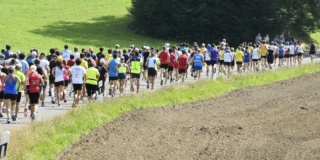
Interview with Fabian Anrig
Fabian Anrig succeeded in winning the Swiss Champion title in his first ever marathon. After a defensive first half, the primary school teacher made all the difference in the second half.
You were still competing as a mountain biker up until a few years ago. You then went on to win the Swiss Marathon Champion title at the end of October. What were your reasons for giving up biking and turning to running instead?
Even as a child, before I discovered biking, I was quite successful at many runs. As a teenager, however, running somehow lacked the action I was looking for. My brother introduced me to mountain biking. We initially competed in cross country races for several years and subsequently moved on to downhill and enduro races. From time to time we went jogging as alternative training. When studying to become a primary school teacher, my specialised subject was sports. The course work involved having to compete in an endurance competition. This is what first led me to the idea of running a marathon. I subsequently decided to run a half marathon first. After a good three-month preparatory phase, I was then able to win it at the Bündner Spring Run 2014. This aroused my enthusiasm and since then, I was no longer able to get the idea of a marathon out of my head.
You ran 42.2 km for the first time in Lucerne. How did you find the marathon?
I will always remember my first marathon as being a fantastic experience. I expected it to be one of the toughest things I have ever done and was surprised that it wasn't at all that brutal. This is probably because I divided up the race very well. Thanks to my trainer, I didn’t start too fast and neither did I let the competition, which were still ahead at the half-marathon mark, put me off. As it happened, I was able to keep up my rhythm right to the finish and was alone at the forefront from around the 25-kilometre mark. The biggest challenge was probably a small pulling sensation in my left thigh, which started after roughly 30 kilometres. I hoped that this pulling sensation would not turn into a cramp. My lead was big enough for me to decide not to push myself unnecessarily and thus risk an injury. I played it safe and tried to continue running at stride that was as beautiful and energy-saving as possible. This went really well, and I was thus able to bring the victory home. My time would have probably been even better if I had not felt this pulling sensation.
Can you explain your training philosophy? What did your preparation look like?
Compared to my training for half marathons or 10 km runs, the biggest change was probably the so-called long runs. These involved runs between 30 and 36 km at a pace of roughly 3:50 min/km, of which I completed six in preparation for the marathon. Fortunately, my girlfriend accompanied me on her bike most of the time, so I could also get in plenty of nutrition practice. I spent the autumn holidays in Majorca, where I put the finishing touches on my preparation for the SwissCityMarathon. Such a training camp in the south always feels a bit like being on holiday to me, so I enjoy relaxing on the beach after the training sessions, sunbath, and savour the coffee and good food. I subordinate a lot to the sport; however, I always find room for fun and pleasure, otherwise it wouldn’t be right for me anymore.
You are able to reconcile your work as a teacher with sports. What are your most important tips for striking this balance and becoming faster and faster?
I have to divide my time well. This does not mean, however, that I fill all my leisure time with one training unit after the other. Then I would have burned out a long time ago. I try to find a good compromise between work, training, and recovery and am aware that I also need to make room for massages or a lazy afternoon on the couch. I also go regularly to the sauna and enjoy a moment of peace there.
Do you have a secret tip you would be willing to share with us? A training, nutrition, or recovery tip, for example.
For those wanting to take a step forward in terms of training, I can only advise you to work with an experienced coach. At the beginning, I did everything myself and spent countless hours exploring the right training methods. However, since I’ve been using tailored training plans, I know what a relief it is just to look at the plan and not have to spend a long time studying what I should now be training and when. Despite the plan, I feel it is extremely important to listen to yourself and know when you should do a training unit and when you would be better to change down a gear. Lately, however, I was able to experience that the body can sometimes endure much more than you think.
Foto: ZVG
Many thanks to Fabian Anrig for the exciting answers.
This may be of interest for you too


